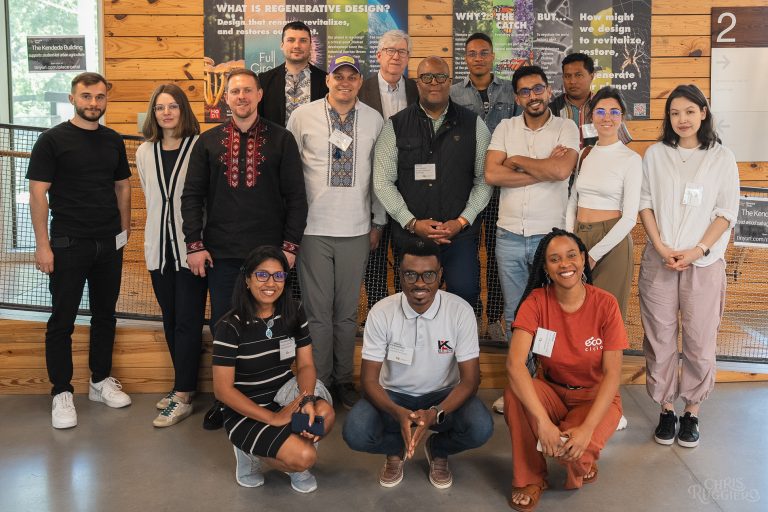Editor’s note: This article was originally published by Georgia Tech’s Enterprise Innovation Institute and is reprinted with permission.
In the ongoing war Russia and UkraineYevhen Popov is something of an information warrior.
Popov is Osavl’s director of civic partnerships and research. KyivA Ukraine-based information security startup founded in 2022.
The company’s software uses artificial intelligence to enable governments, non-governmental organizations, media and other private sector clients to collect and analyze data from online networks and platforms to combat disinformation and cyber attacks. The software was launched shortly after the war broke out in Ukraine.
“The invasion was not just a military attack on the ground with military force, but also an attack on people’s minds,” Popov said. “Disinformation attacks are happening almost every day, two or three times a day, and this is our response. This is a guide to protect government institutions and businesses from these harmful narratives and protect them from harm and harmful effects of these attacks.”
Popov and 18 other entrepreneurs, mostly from Ukraine but also from other countries, including Sri Lanka, Jordan, Fiji, Botswana, Braziland Mongolia — spent a few weeks in May and early June at Georgia Tech’s Encore. U.S. Department of State program.
The effort is Global Innovation Initiative through Science and Technology (GIST)connects innovators from emerging countries looking to scale with U.S. faculty experts and ecosystem builders who can help them succeed.
GIST is Nakia MelecioMelecio, who heads the Innovation Lab Initiative at Georgia Tech’s Enterprise Innovation Institute, the economic development arm of the university, was tapped to lead GIST-related ecosystem-building efforts in Asia, Africa, Europe and the Asia-Pacific region. latin america.
During their time on campus, the entrepreneurs met with campus leaders, researchers and economic development professionals from Georgia Tech’s Office of Commercialization, Venture Lab, CREATE-X, International Initiatives and EI, the Enterprise Innovation Institute.2 global.
“We have the opportunity to share not only resources but also best practices, helping innovators not only forge their way within their own ecosystem but also figure out how to make it to the U.S.,” Melesio said, adding that Georgia Tech plans to host another group of entrepreneurs from Egypt later in the summer.
“The Enterprise Innovation Institute is excited to provide the level of mentorship, support and access that founders need to succeed and achieve their goals.”
Visiting entrepreneurs are equally excited.
“It’s really interesting to be here because the startup ecosystem is so big in Atlanta and in Georgia,” Popov said. “It’s a good opportunity to be here with people who know what they’re doing and how they’re doing it.”
Looking to expand his network and global reach, Aliuntuya Altangerel, co-founder and CEO of Brighton EdTech in Ulaanbaatar, Mongolia, became interested in Georgia Tech.
The language-learning startup was founded in 2011 to encourage English acquisition in an interactive way, and Altangerer is exploring whether the model can be replicated outside his home country of 3.3 million people.
“Because we have such a small population, startups have no choice but to go global to scale,” she said. Being at Georgia Tech also gives her and other Georgia Tech-sponsored entrepreneurs the opportunity to be fully immersed in the ecosystem of successful startups.
“The startup ecosystem in our country is at the seed level. It’s growing faster and faster, but there are still few opportunities to get investment,” she said. “For us, we see this as a once-in-a-lifetime opportunity to jump into this ecosystem and learn as much as we can.”
Nevindari Premaratne is the founder and CEO of The Makers, Sri Lanka, a company that aims to instill a habit of innovation in kids through hands-on STEM activities and community building. The company partners with educational institutions, non-governmental organizations, and private companies to reach out to underserved schools and empower girls in STEM fields.
“We’re gaining a lot of knowledge from Georgia Tech,” Premarasne said, adding that her company has shipped activity boxes to 10 countries and is looking to scale up.
“The ecosystem in our country is small,” she said, “and we want to improve our network here and seek investment opportunities and partnerships. This is really important to us because that’s the area we’re working in: education.”
Learning how to break into the U.S. market is exactly what Vlad Popov was trying to accomplish at Platma, a two-year-old, Kyiv-based no-code software development platform.
“Our specific goal is to find investors in the U.S. and build partnerships that will help us conquer the American market,” said Vlad Popov, Platoma’s marketing director.
He said the war in Ukraine is driving these growth plans: “In this case, the war has accelerated our growth because we understand that every day could be our last and we work as hard as we can,” he said, noting that while his team is mostly remote, their work is often interrupted by alarm sirens, power outages and missile attacks.
“Starting a business is a good thing because it gives people jobs, it gives you taxes, it contributes to a stronger economy. Even if it’s difficult, it’s important to start a business.”


